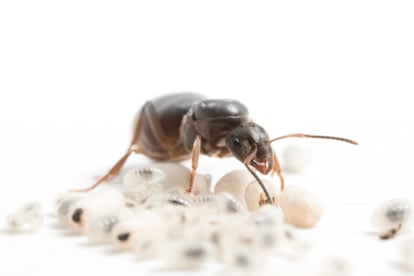Queen ants can learn how to be single mothers
A study shows that a lack of workers prompts colony leaders to take on caregiver roles for the offspring

Ants, well-versed in hierarchies, exhibit intricate social structures across over 13,000 species. Within these colonies, queens oversee egg-laying, males are in charge of fertilizing, while worker ants — wingless, sterile females — nurture the young, forage for food, and construct nests. When a colony initially forms, the queen will nurture her first offspring. Then she focuses on egg-laying exclusively, relinquishing caregiver duties. This traditional theory, however, is now being challenged.
New research found that when workers vanish and the males die after reproducing, the queen adapts to single motherhood and resumes caring for her offspring. The study, recently published in Functional Ecology, challenges the predominant view that queen specialization is innate and irreversible.
“We expected the queen’s specialization to be consistent and not dependent on environmental conditions,” said biologist Romain Libbrecht, one of the study authors. A team of researchers from France’s National Scientific Research Center (CNRS) led by Libbrecht, found that the availability of worker ants is what triggers and conditions the queen to stop caring for offspring and focus on laying eggs.
The division of labor in an ant colony was traditionally seen as a rigid social structure. Biologist Xim Cerdá from the Spanish National Research Council’s (CSIC) Department of Ethology and Biodiversity Conservation did not participate in the study, but notes that labor specialization in ant colonies may now be more flexible than previously assumed. Libbrecht’s team was surprised to discover that queens quickly abandon their specialization when workers are not around, even after years of solely laying eggs.
The research team conducted 17 experiments on the common garden ant, Lasius niger, and recorded over 3,000 hours of video. By isolating the queen, researchers studied how long the eggs and larvae were cared for in various situations. This included scenarios with and without food, using young workers, and removing workers after 30-38 months. Libbrecht said it was initially difficult to control worker presence near queens that hadn’t produced any yet, especially when they were from different colonies and would attack each other. “The solution was to use very young workers, less than 10 hours old,” he said.
After analyzing their data, the research team discovered that isolated queens resume non-reproductive tasks, such as caring for their offspring. This transition occurs swiftly, sometimes within 24 hours, or at most, within three days after the workers’ absence. Once they take on the role of sole caregivers, reintroducing a few workers prompts the queen to shift focus back to egg production. However, these workers must be capable of performing their duties. If they are nearby but unable to care for the brood, the queen steps back in to fulfill the task. “The presence of ants that can actually do the work is what drives behavioral change,” said Cerdá. To verify the results, the researchers also experimented with another ant species, Temnothorax nylanderi, and observed similar behaviors.
The finding highlights the important role of the social environment in shaping behaviors. Since very little is known about the emergence and continuity of queen specialization, “[the study] may change our understanding of how the division of labor is regulated and how it emerged and evolved in the first place,” said Libbrecht. Their findings offer insight into the social structures of various insects, such as bumblebees, bees, termites and wasps. These insects, much like ant colonies, are regarded as specialized superorganisms.
Sign up for our weekly newsletter to get more English-language news coverage from EL PAÍS USA Edition
Tu suscripción se está usando en otro dispositivo
¿Quieres añadir otro usuario a tu suscripción?
Si continúas leyendo en este dispositivo, no se podrá leer en el otro.
FlechaTu suscripción se está usando en otro dispositivo y solo puedes acceder a EL PAÍS desde un dispositivo a la vez.
Si quieres compartir tu cuenta, cambia tu suscripción a la modalidad Premium, así podrás añadir otro usuario. Cada uno accederá con su propia cuenta de email, lo que os permitirá personalizar vuestra experiencia en EL PAÍS.
¿Tienes una suscripción de empresa? Accede aquí para contratar más cuentas.
En el caso de no saber quién está usando tu cuenta, te recomendamos cambiar tu contraseña aquí.
Si decides continuar compartiendo tu cuenta, este mensaje se mostrará en tu dispositivo y en el de la otra persona que está usando tu cuenta de forma indefinida, afectando a tu experiencia de lectura. Puedes consultar aquí los términos y condiciones de la suscripción digital.









































